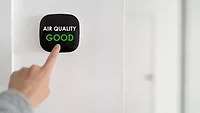Safeguarding Indoor Air Quality: Proactive Strategies
Expert Tips on Mold Prevention, Health Risks, and Effective Remediation for a Healthier Home Environment

bombermoon/ iStock / Getty Images Plus via Getty Images
Mold poses significant health risks and can be a persistent problem in homes, particularly in areas prone to moisture. Tony Abate, Certified Mold Inspector and Vice President and Chief Technology Officer at AtmosAir Solutions in Fairfield, Connecticut, emphasizes the importance of early detection and prevention of mold to maintain indoor air quality.
Health Risks of Mold Exposure
“Mold can cause minor respiratory problems such as coughing, headaches, and sore throats,” Abate said. “Prolonged exposure can lead to more severe symptoms, which is why it’s crucial to spot and remove mold as soon as possible.”
Exposure to a large number of mold spores can cause allergic reactions, including watery eyes, sneezing, and difficulty breathing. Abate noted that repeated exposure can heighten sensitivity, leading to more intense allergic responses. These problems are particularly concerning indoors, where mold significantly impacts air quality.
“Certain molds, such as Stachybotrys and Aspergillus, can produce toxins called mycotoxins under specific conditions,” Abate said. “Exposure to these mycotoxins can lead to more serious health issues.”
Mold Prevention Tips
Keeping your home dry is key to preventing mold growth. “Water leaks and dampness are the main culprits,” Abate said. “Make sure basements are sealed, gutters are in good condition, and landscaping slopes away from your home to prevent water from collecting around the foundation.”
Spills and leaks should be cleaned and dried immediately to avoid mold. Proper maintenance of heating and air conditioning systems is also critical, as HVAC units can become breeding grounds for mold and bacteria if not properly serviced.
“An HVAC system that’s not serviced regularly can spread mold, dust, and bacteria, which can worsen indoor air quality and lead to allergy symptoms,” Abate explained. “This is especially concerning for those with asthma or respiratory conditions.”
He also highlighted the term "dirty sock syndrome," which refers to the foul odor emitted from HVAC vents due to mold and debris buildup on the system’s evaporator coils. Regular HVAC maintenance helps prevent such issues and maintains a healthier environment for everyone in the home.
Abate recommended air purification systems, particularly those with HEPA filters, to capture airborne mold spores. He also noted the benefits of bi-polar air ionization devices that can be added to HVAC systems to neutralize mold spores and other contaminants, improving indoor air quality.
Mold Remediation
If there is active mold growth, simply cleaning the surface may not suffice. In many cases, affected materials need to be removed or encapsulated to prevent further spread. Abate advises homeowners to contact an indoor air quality (IAQ) professional to test and investigate potential hidden mold.
“A professional should write a remediation plan that outlines how to remove and clean the affected areas properly,” he said. “This ensures that the mold is effectively dealt with and won’t continue to spread.”
Keeping your home dry, preventing water intrusion, ensuring proper HVAC maintenance, and cleaning spills quickly are essential steps to prevent mold growth. Following these practices can help homeowners maintain a healthier living environment and reduce the risks associated with mold exposure.
Looking for a reprint of this article?
From high-res PDFs to custom plaques, order your copy today!











